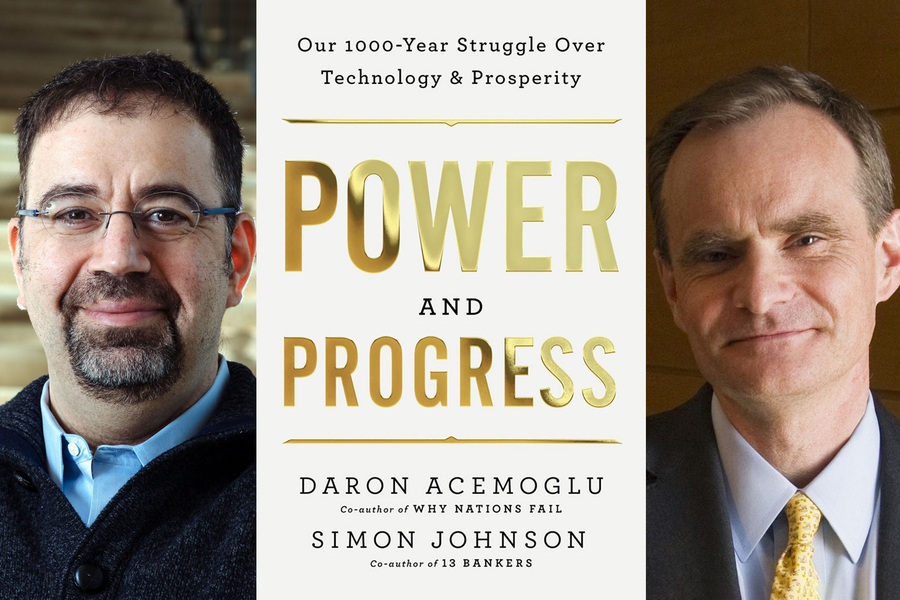In their new book, “Power and Progress,” Daron Acemoglu and Simon Johnson ask whether the benefits of AI and automation will be shared widely or feed inequality.
Copyright: news.mit.edu – “An AI challenge only humans can solve” – AI and Automation
 The Dark Ages were not entirely dark. Advances in agriculture and building technology increased Medieval wealth and led to a wave of cathedral construction in Europe. However, it was a time of profound inequality. Elites captured virtually all economic gains. In Britain, as Canterbury Cathedral soared upward, peasants had no net increase in wealth between 1100 and 1300. Life expectancy hovered around 25 years. Chronic malnutrition was rampant.
The Dark Ages were not entirely dark. Advances in agriculture and building technology increased Medieval wealth and led to a wave of cathedral construction in Europe. However, it was a time of profound inequality. Elites captured virtually all economic gains. In Britain, as Canterbury Cathedral soared upward, peasants had no net increase in wealth between 1100 and 1300. Life expectancy hovered around 25 years. Chronic malnutrition was rampant.
“We’ve been struggling to share prosperity for a long time,” says MIT Professor Simon Johnson. “Every cathedral that your parents dragged you to see in Europe is a symbol of despair and expropriation, made possible by higher productivity.”
At a glance, this might not seem relevant to life in 2023. But Johnson and his MIT colleague Daron Acemoglu, both economists, think it is. Technology drives economic progress. As innovations take hold, one perpetual question is: Who benefits?
This applies, the scholars believe, to automation and artificial intelligence, which is the focus of a new book by Acemoglu and Johnson, “Power and Progress: Our 1000-Year Struggle Over Technology and Prosperity,” published this week by PublicAffairs. In it, they examine who reaped the rewards from past innovations and who may gain from AI today, economically and politically.
“The book is about the choices we make with technology,” Johnson says. “That’s a very MIT type of theme. But a lot of people feel technology just descends on you, and you have to live with it.”
Thank you for reading this post, don't forget to subscribe to our AI NAVIGATOR!
AI could develop as a beneficial force, Johnson says. However, he adds, “Many algorithms are being designed to try to replace humans as much as possible. We think that’s entirely wrong. The way we make progress with technology is by making machines useful to people, not displacing them. In the past we have had automation, but with new tasks for people to do and sufficient countervailing power in society.”
Today, AI is a tool of social control for some governments that also creates riches for a small number of people, according to Acemoglu and Johnson. “The current path of AI is neither good for the economy nor for democracy, and these two problems, unfortunately, reinforce each other,” they write.
A return to shared prosperity?
Acemoglu and Johnson have collaborated before; in the early 2000s, with political scientist James Robinson, they produced influential papers about politics and economic progress. Acemoglu, an Institute Professor at MIT, also co-authored with Robinson the books “Why Nations Fail” (2012), about political institutions and growth, and “The Narrow Corridor” (2019), which casts liberty as the never-assured outcome of social struggle.[…]
Read more: www.news.mit.edu


In their new book, “Power and Progress,” Daron Acemoglu and Simon Johnson ask whether the benefits of AI and automation will be shared widely or feed inequality.
Copyright: news.mit.edu – “An AI challenge only humans can solve” – AI and Automation
“We’ve been struggling to share prosperity for a long time,” says MIT Professor Simon Johnson. “Every cathedral that your parents dragged you to see in Europe is a symbol of despair and expropriation, made possible by higher productivity.”
At a glance, this might not seem relevant to life in 2023. But Johnson and his MIT colleague Daron Acemoglu, both economists, think it is. Technology drives economic progress. As innovations take hold, one perpetual question is: Who benefits?
This applies, the scholars believe, to automation and artificial intelligence, which is the focus of a new book by Acemoglu and Johnson, “Power and Progress: Our 1000-Year Struggle Over Technology and Prosperity,” published this week by PublicAffairs. In it, they examine who reaped the rewards from past innovations and who may gain from AI today, economically and politically.
“The book is about the choices we make with technology,” Johnson says. “That’s a very MIT type of theme. But a lot of people feel technology just descends on you, and you have to live with it.”
Thank you for reading this post, don't forget to subscribe to our AI NAVIGATOR!
AI could develop as a beneficial force, Johnson says. However, he adds, “Many algorithms are being designed to try to replace humans as much as possible. We think that’s entirely wrong. The way we make progress with technology is by making machines useful to people, not displacing them. In the past we have had automation, but with new tasks for people to do and sufficient countervailing power in society.”
Today, AI is a tool of social control for some governments that also creates riches for a small number of people, according to Acemoglu and Johnson. “The current path of AI is neither good for the economy nor for democracy, and these two problems, unfortunately, reinforce each other,” they write.
A return to shared prosperity?
Acemoglu and Johnson have collaborated before; in the early 2000s, with political scientist James Robinson, they produced influential papers about politics and economic progress. Acemoglu, an Institute Professor at MIT, also co-authored with Robinson the books “Why Nations Fail” (2012), about political institutions and growth, and “The Narrow Corridor” (2019), which casts liberty as the never-assured outcome of social struggle.[…]
Read more: www.news.mit.edu
Share this: